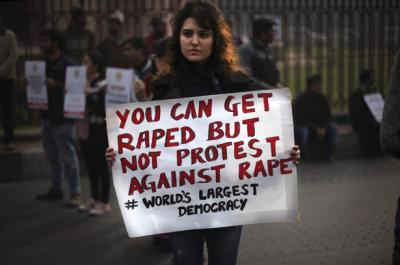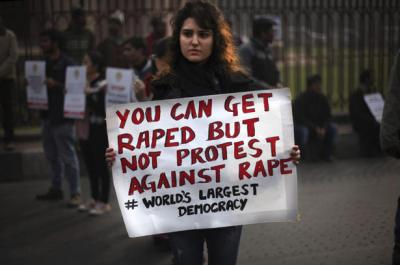
I live in a PG, close to college, because my house is slightly far and the travel is inconvenient. It took me a lot of explaining and convincing to get my parents to let me live separately. They’ve always been very protective and wary of the how unsafe Delhi is. But over the past month it feels like something has changed. I don’t think they’re wary anymore. I think they’re more scared than they ever were. And somehow its not just them, its everyone. Considering how ruthless people seem to have become, nobody wants to take “risks”. I’m used to traveling alone at night with my girl-friends. But over the past few weeks, every time we talk about it, there’s an eerie, uncomfortable feeling. It’s almost like it’s not the same place anymore. My friends tell me they don’t feel safe traveling anymore, be it by autos, metro or even cabs, even in broad daylight. My mom doesn’t want me traveling alone in the dark, even if it’s by cabs. Everybody’s vehemently talking about justice and the need for safety, autos are coming up with panic buttons and people are actually coming out to protest about the lax cops, the need for severe punishment and upping the security levels.
Amidst all this, there remains a section of our population which will always talk about women’s safety being in their own hands. And don’t mistake this for that section which wants women empowerment through ensuring all women are capable of self defense. I’m referring to the quiet significant number of people in our Indian society who believe that it is up to a girl to not be called fast, keep safe and live a protected life, by following the very norms which socialize Indian girls into subservient dummies who are easily suppressed by their male counterparts.
It’s not uncommon to hear neighborhood aunties talk about how “she’s always wearing provocative clothes” or “always hanging around with boys”, or “goes out at night”, with smug expressions and an unsaid agreement about how the girl is calling for trouble. If “Prevention is better than Cure”, then why does Prevention here, refer to girls following a certain code of conduct in order to not be raped or harassed. Why doesn’t it apply to boys, who need to be brought up respecting women and learning to control their desires. Isn’t that what socialization should be about? Shouldn’t the babas of the world be preaching to the boys to keep it in their pants, rather than telling the girls to fall at their attackers’ feet and appeal to them as her “bhaiyas”. Shouldn’t parents be instilling morals in their sons about how a girl’s clothes are not an index to her availability, rather than telling their daughters how she’s merely going to attract attention by dressing in a way which is even slightly off the conservative Indian code of dressing – cover everything. I’m not saying that every person in our society believes in such unfair notions, but a considerable number do. The city be made safer, rather than the girls be put under curfews and restrictions.
When flipping through the channels on TV while an aunty from the neighbourhood settled herself beside me, I randomly started watching some movie called “Tanu weds Manu”. In a series of scenes where two girls were seen smoking a doobie, and drinking from time to time, aunty-ji had already declared them as being bad girls, jinse “kaun shaadi karega? inke sath sab ek hi cheez karna chahenge.” I don’t mean to advocate smoking or drinking, but I DO know for sure if these were the male actors instead of the female ones, aunty would have hardly even noticed. I wonder how in such a judgmental society, where any deviation from the “correct” code of conduct is an invitation to be violated, how can one even think about equality? We do need a hike in security measures across the city very urgently, but at the same time, we as a society need to rethink the kind of morals and values we are focusing on, and where these restrictions and norms need to be applied. Though the world didn’t end on the 21st of last month, but the utter cruelty of the case that everyone knows I’m talking about makes it look like a part of humanity did. In a culture that constantly seeks to prove itself SO rich in values and SO moralistic, one begins to wonder whether being conservative is actually synonymous with being moralistic, or maybe are we just fooling ourselves.




 The English department of DU has recently been ranked among the top 100 places to study english, by the QS World University Rankings. Ranked in the 51-100 group in QS’s annual survey, DU happens to be in the same league as Durham University, Dartmouth University, Pennsylvania State University, University of Sussex and the like, having beaten the likes of Nottingham and Purdue.
The English department of DU has recently been ranked among the top 100 places to study english, by the QS World University Rankings. Ranked in the 51-100 group in QS’s annual survey, DU happens to be in the same league as Durham University, Dartmouth University, Pennsylvania State University, University of Sussex and the like, having beaten the likes of Nottingham and Purdue.
